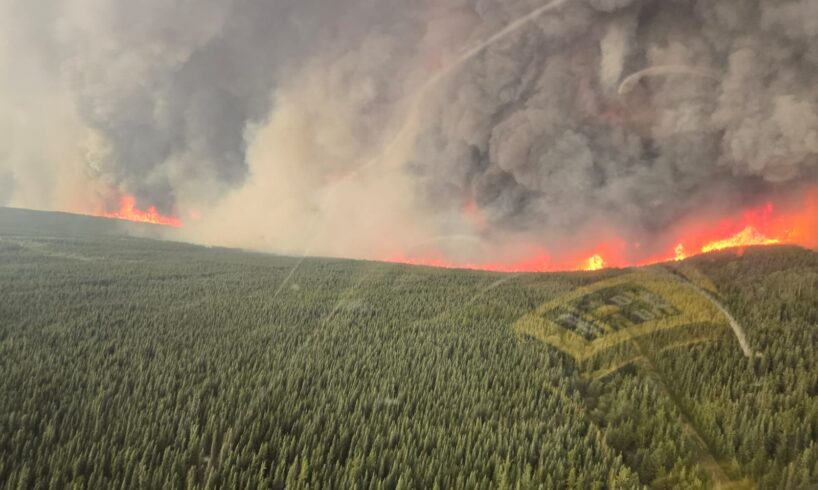
Open this photo in gallery:
The Pocket Knife Creek wildfire south of Fort Nelson, B.C., June 10. Seven in 10 respondents in B.C. say they had taken some action to reduce wildfire risk, according to a survey.The Canadian Press
Canadians who live in the West are much more likely than those in the rest of the country to have taken action to reduce wildfire risk and mitigate the impacts of wildfire smoke, according to new polling.
The national survey, conducted for The Globe and Mail by Nanos Research, asked Canadians what steps, if any, they had taken in their households in the past two years to address concerns about the intense wildfires that have swept the country, selecting all options that applied.
In British Columbia, where seven in 10 respondents said they had taken some action, 36 per cent of respondents had addressed wildfire hazards on their properties, such as cleaning up shrubs, trees and dead materials; 35 per cent had changed travel plans because of wildfire smoke and air quality advisories; and 32 per cent had purchased air purifiers to address smoke. About 23 per cent had packed a bag in the event of a sudden evacuation order.
A little more than half of those in the Prairie provinces said they had taken action; 26 per cent said they addressed wildfire hazards on their property, 33 per cent had changed travel plans and 21 per cent purchased air purifiers. Nine per cent had packed an evacuation bag.
Nationally, about four in 10 Canadians reported that they had taken any action in the past two years.
Nik Nanos, founder and chief data scientist at Nanos Research, said in an e-mail to the Globe that the findings speak “to a reality that, currently, the west is ground zero for wildfires.”
In contrast, Quebeckers were least likely to have taken any action, with just two in 10 respondents reporting that they had. Of those, 6 per cent had addressed wildfire hazards on their property, 8 per cent had changed travel plans, 5 per cent had purchased air purifiers and 3 per cent had packed a bag.
The hybrid online and telephone survey of 1,047 people was conducted between July 2 and 6, with an accuracy of plus or minus three percentage points, 19 times out of 20.
Canada recorded its worst wildfire season in 2023, with more than 17 million hectares burned, far exceeding the 10-year average of 2.7 million hectares.
Forrest Tower, an information officer with BC Wildfire Service, said he was not surprised that British Columbians were more likely to have taken action. The province has run extensive public education campaigns on emergency preparedness and reducing wildfire risk, he noted. A number of high-profile fires in recent years have also made the issue top of mind for many.
“It is almost guaranteed that every summer there will be fires somewhere, and so it’s topical in the media every summer in B.C., whereas in other provinces it might not be as much,” Mr. Tower said in an interview.
A year after Jasper burned, the class of 2025 marks a graduation forged through fire
In B.C., where fires also set a record in 2023 for being the most destructive in the province’s recorded history, 2.8 million hectares of forest and land burned, tens of thousands of people were displaced, and hundreds of homes and structures were lost and damaged. Six wildland firefighters died.
This year’s wildfire season has had an early and intense start. Fires that swept through Saskatchewan and Manitoba displaced more than 30,000 people before even the start of summer and triggered province-wide states of emergency.
In a rare occurrence, Manitoba last week declared its second state of emergency this year, with Premier Wab Kinew pleading for more accommodations to shelter evacuees.





